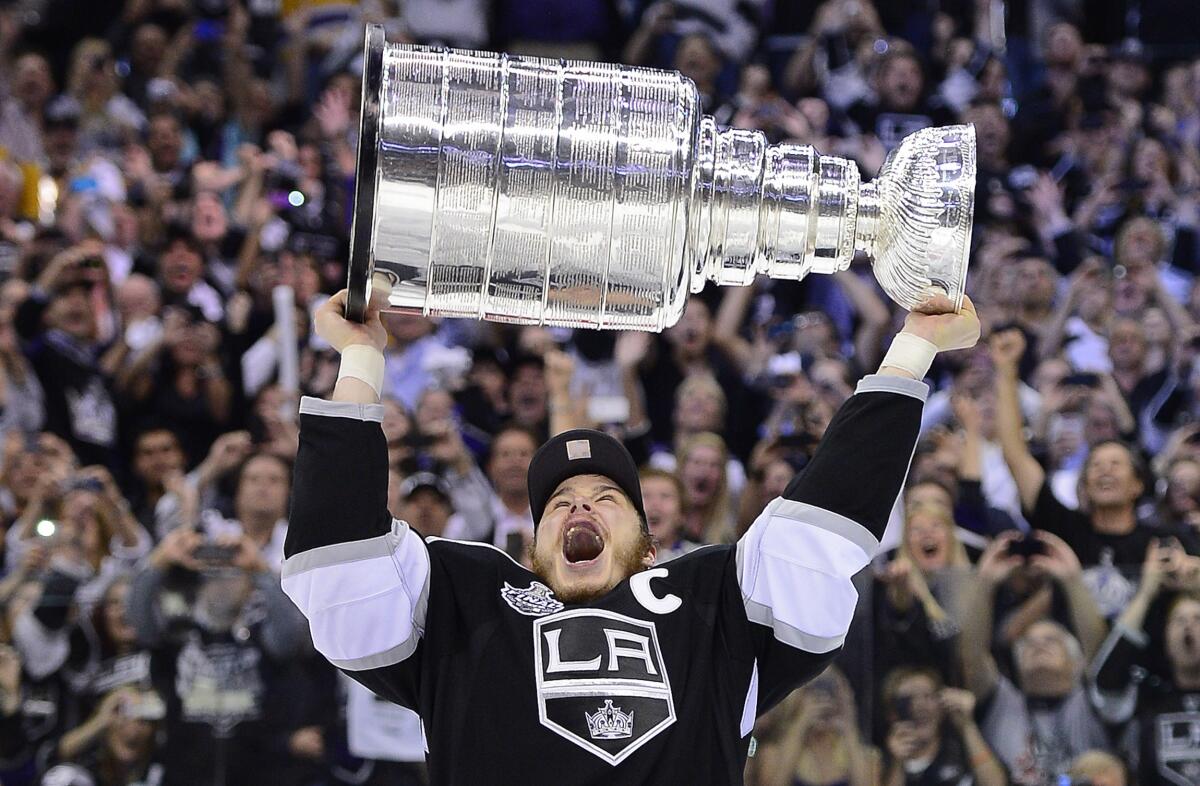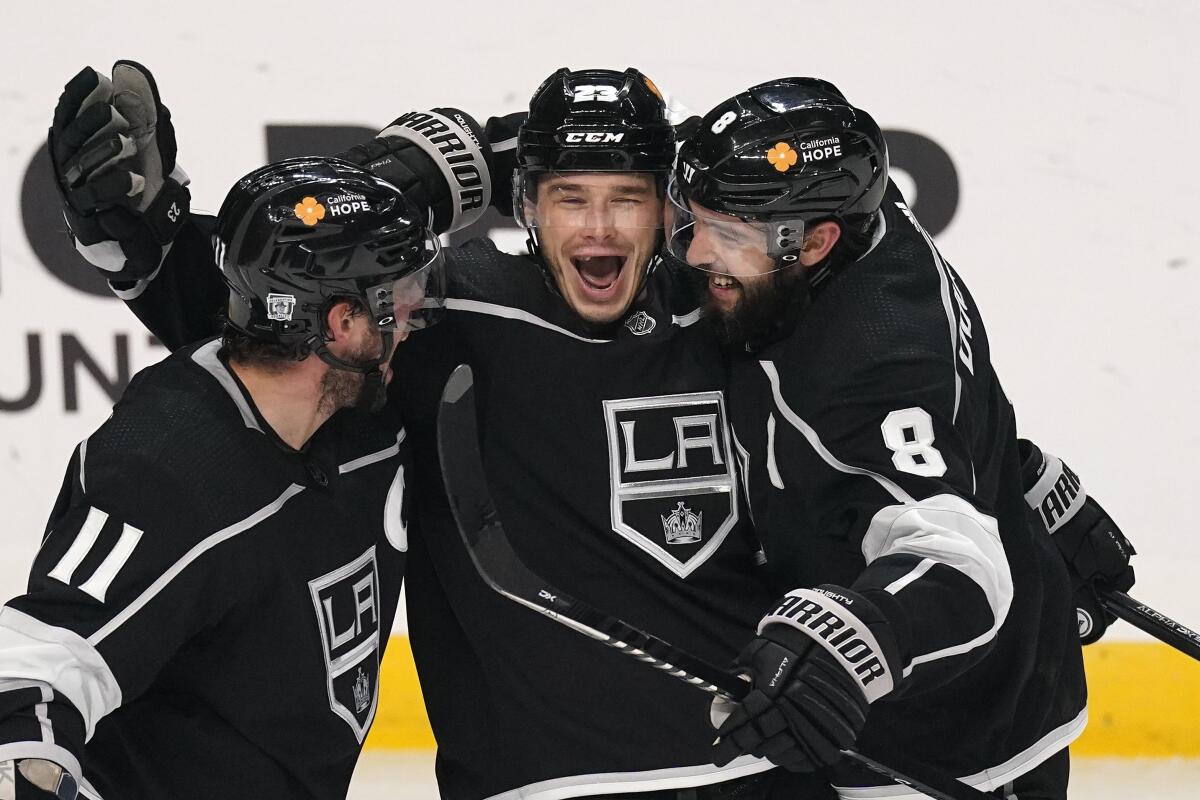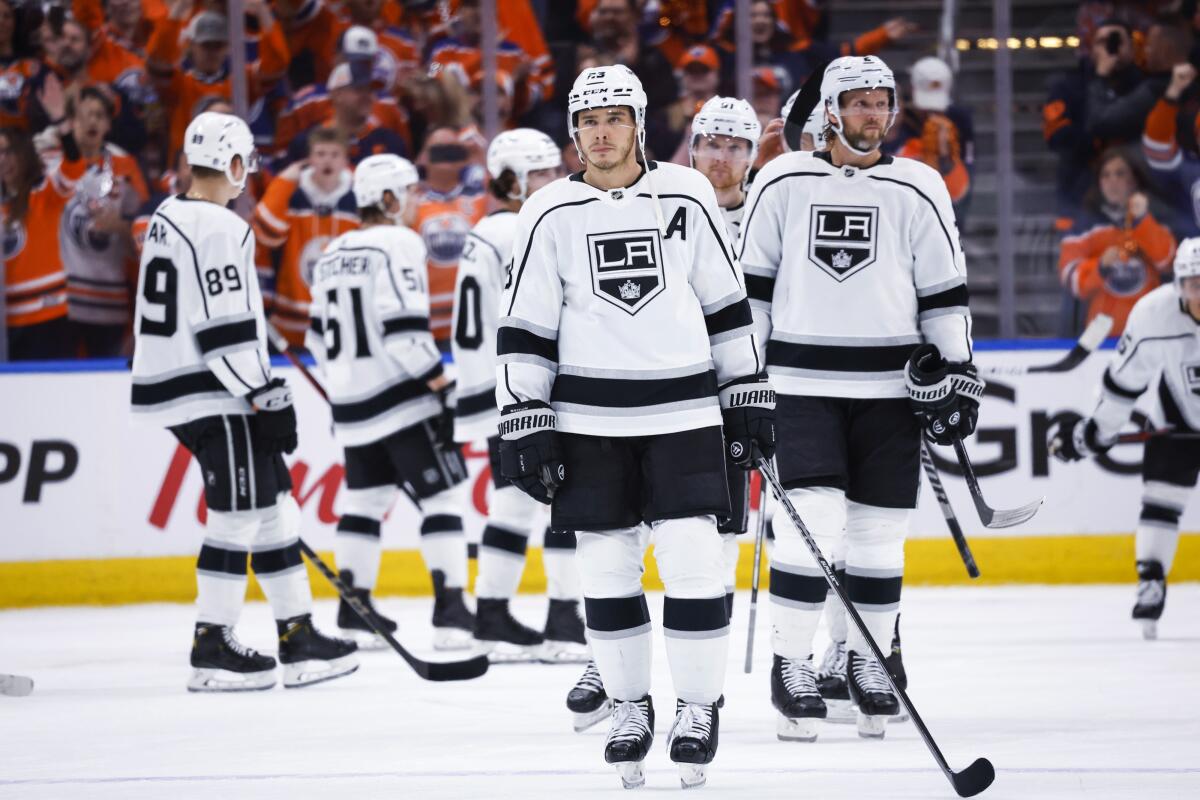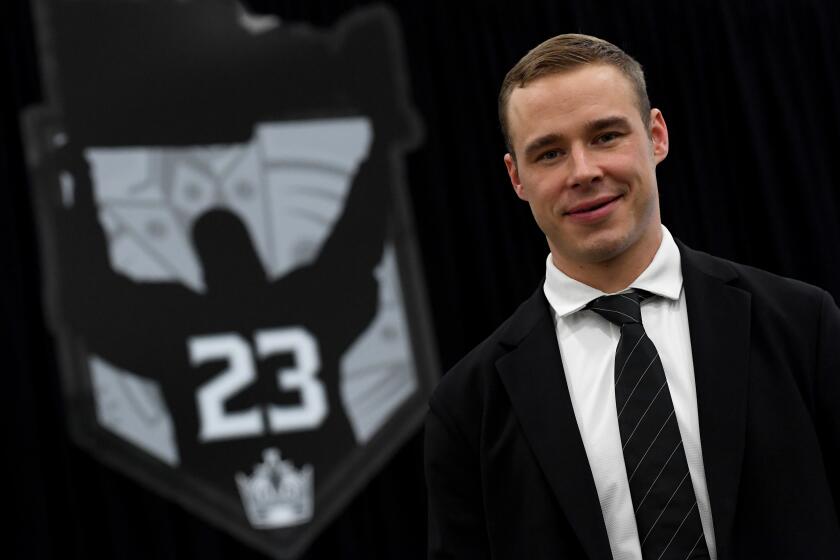Column: Fit for a King: Dustin Brown is more than worthy of a statue

- Share via
Dustin Brown entered Staples Center/Crypto.com Arena hundreds of times during his 18-year career, but his path didn’t take him through Star Plaza and the forest of outsized statues that immortalize some of Los Angeles’ greatest athletes.
Not until he retired and began using the public gates this season did he realize the glittery depth of a bronzed lineup that includes Wayne Gretzky, Luc Robitaille, Jerry West, Kareem Abdul-Jabbar, Magic Johnson, Elgin Baylor and announcers Chick Hearn and Bob Miller.
“I was like, ‘Wow,’ ” Brown said. “As a player you never walk in through those entrances.”
That distinguished lineup will grow Saturday when the Kings unveil a statue of Brown — the captain of their two Stanley Cup championship teams and career leader with 1,296 games played — and retire his No. 23 jersey. The kid from Ithaca, N.Y., whose speech impediment contributed to his shyness when he made his Kings debut at 18 in 2003 will stand tall among his adopted city’s best.
Kings’ Dustin Brown, Ducks’ Ryan Getzlaf put SoCal on NHL map. They began their careers together, both were captains, and both are retiring.
“It’s very surreal. You grow up, you’re not playing for a statue. I just wanted to be a player in the NHL,” he said. “Looking back at it, I’m extremely proud and extremely honored with everything, but it’s one of those things that you make small decisions, small choices each and every day, and then all of a sudden you’re here. It’s a very proud moment for me, but something I never would have imagined five, 10, 15, 20 years ago.”
Why a statue for someone so recently retired, a player whose stats, though among the top 10 in team history in most key categories, don’t match the exalted level touched by Hall of Famers Gretzky and Robitaille?
Why not? Brown did something Gretzky and Robitaille couldn’t: He won the Cup for the Kings, fulfilling a dream many longtime fans doubted would come true. He also was only the second American-born captain to lift the Cup, after Dallas’ Derian Hatcher in 1999, and was the franchise leader in hits, with 3,632.
Equally important is that he led with his heart while promoting a new brand of commitment and camaraderie in an organization that had lacked leadership. He embodied the Kings at their best, steadying them through the turmoil of a rebuild and becoming an unstoppable force while they reached the promised land and won the Cup in 2012 and 2014.
“Brownie wasn’t that rah-rah leader, but he was the guy that people would look up to just because of the way he worked, the way he carried himself, how much of a pro he was,” said Jarret Stoll, the standout third-line center on those championship teams and now a player development coach and broadcaster.
“He was so good at making sure everybody was involved. That’s what you want. You’re talking about culture or team, you don’t have any kind of culture or any kind of team if you’ve got some guys over here, some guys over there, not everybody’s on the same page. If that’s the case, you don’t play for each other. You don’t play hard for each other. You don’t do the things that you need to do for each other to win.”
Brown ensured the Kings became more than a sum of their very good parts, organizing offseason workouts and in-season gatherings. He roomed with defenseman Drew Doughty early in Doughty’s career, and they developed rituals. Doughty got Brown’s coffee, ordered extra room-service desserts, and adjusted their hotel thermostat just so. Brown shared his wisdom. Doughty soaked it up.
“With the way he played, he carried how the Kings wanted to be,” Doughty said. “He was definitely the epitome of how we wanted to play, and he led the charge in that area.
“Not only did I look up to him on the ice and for hockey stuff, but I looked up to him as a father, as a husband. No one does it better than him. He’s just a great person. He’ll be one of my brothers till the day I die, and I miss him a lot.”

A rendition of Brown lifting the Cup appears on a nearby monument to the team, so the statue should feature a different pose. If the people in charge of such things had a sense of humor — and a sense of history — Brown would be forever checking Vancouver Canucks forward Henrik Sedin into submission in Game 3 of their first-round playoff series in 2012, a moment that set the tone for the Kings’ improbable first Cup run.
It had been a rough season. Their rebuild had stalled after two first-round playoff exits, leading then-general manager Dean Lombardi to fire coach Terry Murray in December and hire Darryl Sutter. Brown was unnerved by persistent trade rumors. The Kings made the playoffs as the No. 8 seed in the Western Conference but had to face the No. 1 Canucks, who had compiled the NHL’s top record for the second straight season.
“We’re just excited to be there in a way, but we’re also playing the two-time Presidents’ Trophy winner, a team that had just lost in the Stanley Cup Final. So there was very little pressure on us internally,” Brown said. “No one gave us a chance, so it made it very easy to go in there and play.”
They won the first two games, in Vancouver. “And 2-0 is great, but people come back from down 2-0, right?” Stoll said. “But at that point, Game 3, that was just to show, ‘Hey, we’re going to roll over you. This is the type of team we are.’ Brownie was that type of player.”
Game 3 was scoreless early in the second period when Brown leveled Sedin in front of the Canucks’ bench. “That was something for us to easily follow, easily just get behind and know that he’s running through the wall for us and we’d better follow that,” Stoll said. “And it was their best player, so it helped even a little bit more, put more of an exclamation point on it. Brownie was an absolute beast, and that’s what we were following.”
At the time, Brown couldn’t imagine the ripples his hit would cause. “When you look back, clearly, it was a big moment. In the moment you never know,” he said. “I hear my teammates talk about it and it was like the whole building changed.
“The series wasn’t over in our mind, but in retrospect, that was my coming-out moment, maybe not to Kings fans but to fans of the greater NHL.”
Brown also scored the only goal in that game. The Kings wrapped up the series in five games and dashed off with the Cup in a tidy 20 games, as Brown and Anze Kopitar tied for the playoff scoring lead with 20 points each.
At the time, Brown wasn’t sure which Sedin twin he had hit, Henrik or Daniel. “I still don’t know,” Brown said, laughing. “They made a point last year, when I retired, to come over and congratulate me. It was really classy, considering the history that we shared. Our careers paralleled and then just that one moment …”
The Kings’ Cup banner-raising ceremony was delayed by a lockout that shortened the 2012-13 season. Their title defense ended in a loss to Chicago in the West finals. “It was a five-game series. It could have been a four-game series probably. They were a much better team,” Brown said. “We just didn’t have the juice that year.”
They had the juice again in 2014, though that road was tougher than their first. They went to seven games three straight times, starting with erasing San Jose’s 3-0 series lead in the opening round, and beat the New York Rangers in five games in the Final. “That second one really solidified our group, I think, and that we belonged up there,” Brown said.
NHL Commissioner Gary Bettman might be despised by fans, but his smart and calculating tactics have reaped financial success for the league’s teams.
“How things transpired after that, obviously there’s regrets on every player. Everyone who was involved. We had a good team, we just couldn’t find a way to keep it rolling. That’s probably the hardest thing in pro sports, learning how to win and keep winning, to be honest with you. It’s really hard.”
Lombardi mortgaged their future in a failed attempt to win again, sticking with “heavy” hockey and ignoring the NHL’s shift to speed and skill. They missed the playoffs in 2015 and won one playoff game in 2016. That summer, in another bad decision, Lombardi stripped Brown of the captain’s ‘C’ — which is almost sacred in hockey — and gave it to Kopitar.
After sacrificing his body for the team, Brown had slowed offensively. Lombardi misread that as Brown losing credibility among his teammates. “Nothing changed for the guys in the room when the captaincy got taken away,” Doughty said. “Brownie always cared about winning first. He just wanted us to win and wanted all of us to succeed as a team and he was never frustrated when he wasn’t getting points.”
Kopitar told Brown he’d still rely on him, though he knew Brown was upset. “It stung,” Kopitar said. “But the friendship and relationship that we had was way more important than whoever was wearing the ‘C.’ Our relationship stayed rock solid and the same.”
Brown is still angry about it. “But it was one of those things where you just learn a lot about yourself and about other people in situations like that and that’s kind of the way I’ve always viewed it,” he said. “But it was like at the end of the day, I was still a King and I still felt like I had more to give.”
Last season, with his contract expiring, the idea of spending more time with his family began to take precedence over prolonging his career. His and wife Nicole’s four kids range in age from 9 to 14, and he had missed too many of their games and milestones. But he had one last wish. “I wanted to go out playing in a game that’s meaningful,” he said.

He accomplished that when the Kings made the playoffs, earning two assists in their seven-game loss to Edmonton. “This team last year, it was a young team, a fun team, kind of learning on the fly,” he said. “I was content walking away. I played a long, successful career, accomplished a lot.”
While deciding what’s next, he has enjoyed going to Kings games without fear of leaving with bruises from opponents’ hits. Besides discovering the Star Plaza statues, he has discovered the indulgent fun of concession-stand food. “I had my first Wetzel’s pretzel and I told my wife, ‘This is life-changing,’ ” he said.
Best of all, retirement means he can chaperone his kids to travel hockey tournaments. “It feels like early NHL days for me because traveling, I’ve got a young roommate — not named Drew, but it’s a young roommate,” he said. “We go to hockey games and come back and just sit in our room and talk.”
Soon, he will be able to tell his kids the stories behind a statue that belongs among the bronzed best and brightest, among champions. No one else will wear his No. 23, either, and that’s only right. He was the first Kings captain to lift the Cup. Because of his example, he won’t be the last.
More to Read
Go beyond the scoreboard
Get the latest on L.A.'s teams in the daily Sports Report newsletter.
You may occasionally receive promotional content from the Los Angeles Times.









